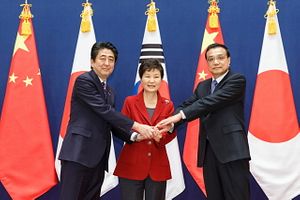Chinese Foreign Minister Wang Yi held his annual press conference Tuesday, on the sidelines of the National People’s Congress. He struck familiar tones on most issues – from reiterating China’s sovereignty over the Spratly Islands in the South China Sea to declaring China’s commitment to a denuclearized Korean peninsula. But Wang did have some surprising comments, including a particularly harsh assessment of the China-Japan relationship.
Some background is necessary here. Ties between China and Japan effectively froze in 2012, when China reacted angrily to the Japanese central government’s decision to nationalize several of the Senkaku Islands (also claimed by China, which calls them the Diaoyu). Things only got worse in December 2013, when Japan’s new prime minister, Shinzo Abe, visited the controversial Yasukuni Shrine. Throughout most of 2014, China-Japan relations remained at a nadir, with little direct diplomatic contact but plenty of sniping and finger-pointing on the world stage.
Then in late 2014 came a breakthrough – a four-point consensus reached by Chinese State Councilor Yang Jiechi and Japanese National Security chief Shotaro Yachi laid the groundwork for a brief meeting between Xi Jinping and Abe on the sidelines of the APEC forum in Beijing. That led to a gradual resumption of diplomatic ties in 2015, from restarted security talks to a finance dialogue. Finally, progress culminated in the long-awaited resumption of a previously annual trilateral summit featuring leaders from China, Japan, and South Korea. From Seoul, Chinese Premier Li Keqiang, South Korean President Park Geun-hye, and Abe proclaimed in a joint statement that “trilateral cooperation has been completely restored.”
Overall, 2015 was a hopeful year for China-Japan relations – not perfect, by any means, but a huge step forward compared to the previous year. There were no breakthroughs on the central challenges – historical issues and the lingering territorial dispute over the Senkaku/Diaoyus – but the volume on both potential flashpoints was turned down. Meanwhile, while progress on negotiating a crisis management mechanism to cover interactions in the East China Sea was painfully slow, at least the two sides were talking about it, and openly acknowledging its importance.
So there were many reasons for Wang to be cautiously optimistic about China-Japan relations in his press conference. But that is decidedly not the route he chose.
When asked about the current state of China-Japan relations, Wang started off with a familiar refrain: that the relationship had been greatly harmed due to Japanese leaders’ “mistaken” approach to historical issues. While he noted “signs of improvement” in the relationship, due to the “efforts of wise leaders on both sides,” overall Wang concluded that “future prospects [for China-Japan relations] still do not allow for optimism.”
Wang was equally blunt about where the blame for the current situation lies – unsurprisingly, he believes Japan is entirely responsible. He accused Japan’s government of “causing trouble” for China, even as the same Japanese leaders speak of their desire to improve China-Japan relations. “This a classic example of a two-faced person’s methods,” Wang said.
Wang told reporters that the root of the problem lies in the way Japan’s current government thinks about China. “Facing China’s rise, should [Japan] take China as a friend or an enemy, a partner or an adversary?” Wang asked, urging Japan to “seriously consider” this question.
By the end of his brief remarks on Japan, Wang had moved from historical issues to a quite forward-oriented outlook: namely that China-Japan tensions are rooted in the modern-day changes caused by China’s rise. And as difficult as it would be to solve historical or territorial issues, the problem of adjusting to shifting balance of power may be even harder to tackle. Historical and territorial spats can at least be shelved; the overarching geostrategic calculations being made by both China and Japan, however, cannot be overlooked.
From China’s perspective, at least, it seems the brief period of optimism about China-Japan relations has come to an end.

































